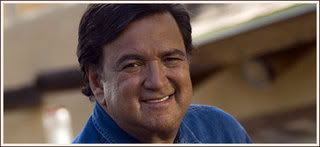Foreign Policy Redux
[Cross-posted at Progressive Historians.]
 After reading my story last night calling for a visionary foreign policy, a Richardson staffer e-mailed me a link to the following speech, delivered by Richardson last summer:
After reading my story last night calling for a visionary foreign policy, a Richardson staffer e-mailed me a link to the following speech, delivered by Richardson last summer:
Certainly, this is a more comprehensive plan than I've seen before from Richardson, and easily more complete than what I've seen from the other candidates. More importantly, the speech demonstrates how Richardson thinks about issues. Where Al Gore's views spring from the unifying principle of conservation, and John Edwards' positions come from an economic perspective, Richardson's opinions stem from an essentially internationalist viewpoint. He's connected immmigration, energy, and environmental policy into his foreign policy like so many chainmaille links. A presidential worldview rooted in foreign policy would be both refreshing and extremely welcome.
On the other hand, what I don't see in all this "new realism" is an overarching guiding principle designed to advance the concepts of piece and global interconnection -- something like Wilson's League of Nations. I wish Richardson would think broader and bolder in his foreign policy, but maybe Wilsonian-style idealism isn't possible in the world Bush's cowboy diplomacy has left us. Wilson's bright vision was "to make the world safe for democracy," maybe it's enough that, under someone like Richardson, we'd be able to make democracy once again safe for the world.
 After reading my story last night calling for a visionary foreign policy, a Richardson staffer e-mailed me a link to the following speech, delivered by Richardson last summer:
After reading my story last night calling for a visionary foreign policy, a Richardson staffer e-mailed me a link to the following speech, delivered by Richardson last summer:Democrats know from experience that maximizing our national strength means knowing when to work with others, and when to act alone. It means knowing when and how to employ our great military.
Above all, it means understanding that military power and diplomacy are not alternatives to one another, but rather are complementary sources of strength. What the Bush Administration has failed to understand is that while diplomacy without power is weak, power without diplomacy is blind.
Democrats offer real solutions that provide a new direction for America. We need a new realism in our foreign policy, which includes the following elements:
One, achieve national security through energy independence. We need a man on the moon effort to reduce our dependency on foreign oil -- go from 65-percent to 20-percent by 2015; increase fuel efficiency; invest in green buildings and fuel cells; and become the leader of the future economic engine of the world - renewable energy, such as ethanol, solar and wind.
Two, re-build alliances and reinvigorate our allies. A far-sighted policy would have built a coalition to prevent Iran from developing nuclear weapons. Most immediately, we need an international coalition for peacekeeping in the Middle East.
Three, focus on the real dangers. Prioritize resources to fight Al Qaeda and Jihadist terrorists and the most urgent dangers, such as nuclear terrorism. That means a new strategy for success in Iraq that allows us to redeploy our troops.
Four, don't outsource our diplomacy. We need direct, face to face talks with North Korea. We should also talk directly with Iran.
Five, we need to pay attention to Latin America, our own back yard. The key is passing a comprehensive immigration plan now that includes enhanced border security, a path to legalization for the 11 million immigrants already here, and sanctions against employers who knowingly hire illegal immigrants. The House should stop holding these silly hearings. Mr. President, your good words on immigration should be followed by deeds to pass a comprehensive plan.
Six, face up to global environmental threats. The first thing this Administration did was reject the Kyoto Treaty. America should be the world's leader, and that means owning up to grave environmental dangers, such as global warming.
Finally, respect human rights and American values. Prisoner abuse, torture, secret prisons and evasion of the Geneva Accords should have no place in our foreign policy.
Certainly, this is a more comprehensive plan than I've seen before from Richardson, and easily more complete than what I've seen from the other candidates. More importantly, the speech demonstrates how Richardson thinks about issues. Where Al Gore's views spring from the unifying principle of conservation, and John Edwards' positions come from an economic perspective, Richardson's opinions stem from an essentially internationalist viewpoint. He's connected immmigration, energy, and environmental policy into his foreign policy like so many chainmaille links. A presidential worldview rooted in foreign policy would be both refreshing and extremely welcome.
On the other hand, what I don't see in all this "new realism" is an overarching guiding principle designed to advance the concepts of piece and global interconnection -- something like Wilson's League of Nations. I wish Richardson would think broader and bolder in his foreign policy, but maybe Wilsonian-style idealism isn't possible in the world Bush's cowboy diplomacy has left us. Wilson's bright vision was "to make the world safe for democracy," maybe it's enough that, under someone like Richardson, we'd be able to make democracy once again safe for the world.
Comments